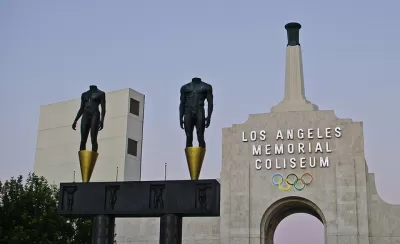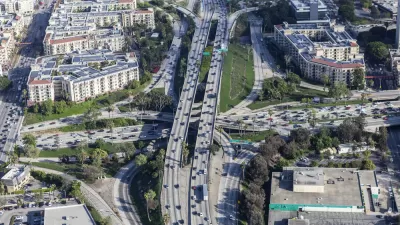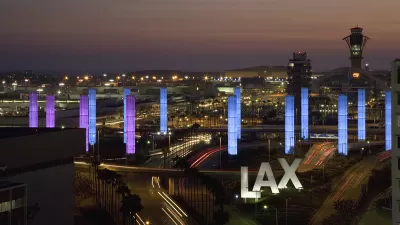Ahead of the 2028 Olympic Games, Los Angeles is rallying around infrastructure buildout and technological advancement.

Los Angeles could see an Olympic Games that is entirely connected by transit, organizers say. At the VerdeXchange 2018 Conference in Downtown L.A., AECOM sports leader Bill Hanway announced, "In our plan, each sports park is entirely accessible by public transport. No private cars will be used at all during the course of the Games."
That vision is driven in large part by LA Metro's plan to accelerate 28 projects for the Olympics, which CEO Phil Washington told the conference is the most ambitious transportation infrastructure initiative in the country. Metro is also in talks with Elon Musk about using his tunnel-boring technology to speed up projects, Washington said.
L.A. hopes that using the Olympics as a stimulus to strengthen existing infrastructure could drive important advancements for the region, unlike in other cities where hosting ended in empty husks and copious debt. Sharing lessons from past games, the panel noted that L.A.'s last go-around, in 1984, prompted the launch of the country's first program to synchronize traffic signals.
But since the city is now in the unusual position of preparing for the games 11 years ahead of time, it must allow for the near certainty that new technologies—especially transportation technologies—will push the limits of what current infrastructure plans can deliver or even imagine.
Justin Erbacci, chief innovation officer at LAX, told the panel that the airport is planning to have not only autonomous cars, but also flying cars (a.k.a. vertical take-off and landing vehicles) in service by the 2028 Olympics. That's on top of the modernization program the airport is already undertaking, which includes an automated people mover that will connect it to Metro rail for the first time.
Read the full discussion in The Planning Report, or watch it on video.
FULL STORY: LA's 2028 Olympics Already Catalyzing Transformative Infrastructure Investments

Maui's Vacation Rental Debate Turns Ugly
Verbal attacks, misinformation campaigns and fistfights plague a high-stakes debate to convert thousands of vacation rentals into long-term housing.

Planetizen Federal Action Tracker
A weekly monitor of how Trump’s orders and actions are impacting planners and planning in America.

In Urban Planning, AI Prompting Could be the New Design Thinking
Creativity has long been key to great urban design. What if we see AI as our new creative partner?

Pedestrian Deaths Drop, Remain Twice as High as in 2009
Fatalities declined by 4 percent in 2024, but the U.S. is still nowhere close to ‘Vision Zero.’

King County Supportive Housing Program Offers Hope for Unhoused Residents
The county is taking a ‘Housing First’ approach that prioritizes getting people into housing, then offering wraparound supportive services.

Researchers Use AI to Get Clearer Picture of US Housing
Analysts are using artificial intelligence to supercharge their research by allowing them to comb through data faster. Though these AI tools can be error prone, they save time and housing researchers are optimistic about the future.
Urban Design for Planners 1: Software Tools
This six-course series explores essential urban design concepts using open source software and equips planners with the tools they need to participate fully in the urban design process.
Planning for Universal Design
Learn the tools for implementing Universal Design in planning regulations.
planning NEXT
Appalachian Highlands Housing Partners
Mpact (founded as Rail~Volution)
City of Camden Redevelopment Agency
City of Astoria
City of Portland
City of Laramie





























